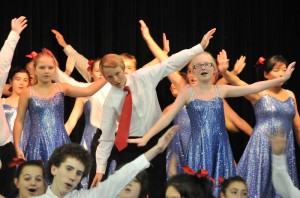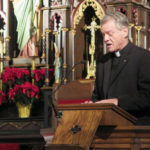By Lindsay Steele
The Catholic Messenger
(Editor’s note: Catholic Schools Week is Jan. 25-31.)
After spending 38 years teaching art in public schools, Steve Lucke knows that fine arts techniques and processes are generally not religious in nature. “It doesn’t matter what denomination you are when it comes to color theory,” chucked Lucke, now an art teacher at St. Joseph Catholic School in DeWitt.
Beyond the technical aspects of creating artwork, music and theater, diocesan educators say fine arts can play a key role in the intellectual and spiritual development of a student.

Swing choir members Brileigh McCumsey, Jacob Felderman and Lauren Schumacher of All Saints Catholic School in Davenport perform in November. In this article for Catholic Schools Week, diocesan Catholic school teachers share their thoughts on faith in the fine arts.
Lee Morrison, diocesan superintendent of Catholic schools, said fine arts courses “encourage critical thinking and creativity which are keys to success in many careers today. Students learn teamwork, self discipline and a greater understanding of all God’s creation through the arts.”
Art and music programs offer Catholic school students an opportunity to express and reinforce their faith through the use of a creative medium. Stewart Beyer, the middle school and high school choir director at Holy Trinity Catholic School in Fort Madison, said: “It’s the best vessel, in a lot of cases, to express your emotions and who you are as a human being. (Fine arts classes) are a perfect environment for discovering who you are as a person of faith. As a teacher, you can challenge students to be confident in their values and morals and reinforce what they’ve been taught by parents and pastors.”
Lucke, a member of Sacred Heart Parish in Maquoketa, Iowa, said one way he can help re-enforce the teachings from Mass and religious education in the visual arts classroom is to assign a sacred subject matter that corresponds with the church calendar.
Even when a sacred subject is not assigned to a project, he notices that students tend to choose religious subject matter anyway. “The subject matter is many times influenced by their beliefs and stories they hear from Bible readings, Masses and religious education programs. I support that here in the classroom … it is obvious that their belief system is very important to them,” Lucke said.
When it comes to music selections for concerts, both private and public schools are likely to choose religious works based on their historic significance and quality. “So much of the music throughout history has been sacred music,” said Diane Mahoney, vocal music teacher at Notre Dame Elementary School in Burlington. However, the Catholic school classroom offers an additional opportunity to teach and facilitate discussion on the themes presented.
“The Catholic school is very freeing, since I can be myself and openly express the glory of the sacred texts and the importance of music in our spiritual and emotional development,” she added.
Mike Barry, the kindergarten through eighth-grade music teacher at All Saints Catholic School in Davenport, said, “In a Catholic school, I can have discussions with my students … as to the true meaning of the song and what it represents.”
Barry loves that he can help students learn to worship through song. He believes St. Augustine said it best: “He who sings once, prays twice.”
Even when teaching a class to perform a secular song, opportunities for faith and values education are present.
Beyer’s swing choir group at Holy Trinity recently performed the pop number “Waiting on the World to Change” by John Mayer. One of its lyrics, “One day our generation is going to rule the population,” got the students thinking about their role as future leaders in the world. “Hopefully, these (students) will be good, God-fearing citizens and uphold their standards,” Beyer said.
Trish Hinchman teaches an eighth-grade drama class at John F. Kennedy Catholic School in Davenport each fall in addition to serving as a music teacher. While finding a religious-themed play with 40-some parts is not always possible, opportunities for the students to practice “gospel values” are abundant while preparing an encouraging, age-appropriate secular play. The qualities that best help to build the teamwork necessary to put on a play include respect, sharing, tolerance, courtesy, honesty, perseverance and responsibility, she said. Before each practice, she sets the tone with a prayer and Scripture reading.
By performance time, she sees a difference in the students. “They are so much closer … they’ve learned how to depend on each other and the importance of working together. They want to pray for each other to have a good performance.”
She added that the responsibility of a fine arts teacher, like any teacher in a Catholic school, is to approach everything with a sense of faith. “I think that’s a huge responsibility for teachers, but a good responsibility to have.”











